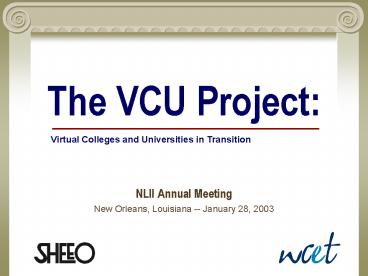The VCU Project: - PowerPoint PPT Presentation
1 / 26
Title:
The VCU Project:
Description:
'At a certain point in history, they may have been the lubricant needed for a ... Information. Contact: Rhonda Epper. rmepper_at_msn.com. Myk Garn. myk.garn_at_kyvu. ... – PowerPoint PPT presentation
Number of Views:25
Avg rating:3.0/5.0
Title: The VCU Project:
1
The VCU Project
Virtual Colleges and Universities in Transition
- NLII Annual Meeting
- New Orleans, Louisiana -- January 28, 2003
2
(No Transcript)
3
Pew Symposium
- At a certain point in history, they may have
been the lubricant needed for a massive shifting
of the gears in higher education. For state
virtual universities, the moment may be
passing. - The notion that VCUs are not needed is likely
to be a cover argument by individual campuses
to avoid collaboration. . . Following this path
would lead to destructive competition, poorly
served students, and very unhappy stakeholders
and funders.
Expanding Access to Learning The Role of
Virtual Universities, July 18-19, 2002, Aspen,
Colorado
4
Venture Units
- The system should provide for new pilot or
demonstration sites to be established within the
system that are separate, preferably isolated
from, other units so as to increase the chances
for innovation and improvement. - Terrence J. MacTaggart (1996)
- Restructuring Higher Education
5
The Growth of VCUs
6
The Growth of VCUs
7
VCU Project Goals
- Identify and describe the types of VCU models in
use by states - Determine and understand statewide goals for VCUs
- Discover and describe major successes, barriers,
and unexpected outcomes
8
Principle Investigators
- Rhonda M. Epper
- Director of Online Program Development,
- Community College of Denver
- Myk Garn
- Chief Academic Officer,
- Kentucky Virtual University
- Research assistance provided by
- Susan Winter, SHEEO Webmaster/Policy Analyst
9
Advisory Team
- Fred Hurst
- Dean of Distance Learning, Northern Arizona
University - Sally Johnstone
- Executive Director, WCET
- Val Lewis
- Commissioner, Connecticut Dept. of Higher
Education - Paul Lingenfelter
- Executive Director, SHEEO
- Tad Perry
- Executive Director, South Dakota Board of
Regents
10
VCU Project Phases
- VCU Literature Review
- 2002 SHEEO/WCET VCU Survey
- Follow-up interviews
- SHEEO Report
- WCET Hewlett Edutools Policy Page
11
Research Questions
- Are virtual universities meeting statewide goals
for which they were created? - What are the different VCU organizational models?
- How have VCUs transitioned themselves since
founding to meet current demands? - What are the major successes, barriers, and
unexpected outcomes of virtual universities?
12
Literature Review
- 100 studies, articles, state reports
- 15-20 core resources
- Goals, mission, organizational structure,
financial models, collaboration models, policies
that enable VCU to operate effectively in a state - Ways to describe VCUs Taxonomies
13
VCU Definitions
- Wolf/Johnstone Taxonomy
- Change Magazine, July/August 1999
- Three types of non-consortia VCUs
- Four types of consortia VCUs
- VCU-1 Degree-granting
- VCU-2 Mutual services formal articulation
- VCU-3 Linked services informal articulation
- VCU-4 Independent services little articulation
14
VCU Models Investigated
- The VCU Project is focused on entities and
endeavors that operate primarily within single
states and that were founded by, or comprise
membership of, the state's public higher
education institutions. - These models appear to occur in two VCU forms -
systemwide and statewide.
15
How VCUs Define Themselves
VCU Type Number of Responses Percent of Responses
VCU-1 0 0.0
VCU-2 26 54.2
VCU-3 7 14.6
VCU-4 15 31.3
Total 48
Preliminary data
16
Preliminary Findings
- VCU Goals
- Funding Models
- Services
- Enabling Policies
17
VCU Goals in Transition
Increasing Goals
- Reducing costs / Centralizing resources
- Increase communication/collaboration
- Better educated workforce
Declining Goals
- Expanding access
- Serving underserved populations
18
Funding Models of VCUs
- Direct state appropriation
- Fees from services to provider institutions
- Tuition/fees charged by VCU
- Partial tuition (e.g., split with provider)
- FTE funding from state
- Membership fees
- Donations/partnerships with private sector
19
Funding Models of VCUs
Percentage of VCUs noting funding source as
major or primary
20
Initial Capitalization of VCU
Average 976,359
Median 600,000
21
Operating Budget of VCU
Average 1,169,513
Median 500,000
22
VCU Funding Plans
Is your VCU currently self-supporting? If not,
is the VCU planning to become self-supporting in
the future?
23 Currently Self-supporting
23 Plan to be Self-supporting
50 No plans to be Self-supporting
23
Services Provided
- Library services
- Online catalog
- Online application
- Online registration
- E-commerce
- Bookstore
- Technical help desk
- Academic help desk (e.g., tutoring)
- Online financial aid
- Coordination of test sites and proctoring
- Marketing
- Faculty/staff training and development
- Course hosting
- Internet Service Provider (ISP)
24
Enabling Policies
- Home College model
- Common course numbering
- Policy development including quality assurance,
tuition, development, transfer/articulation,
property rights, fees, revenue sharing - Standardization scalability
- Statewide or systemwide articulation
25
Future Analysis
- Audience
- Sector/Credential influences
- Primary/Emerging Disciplines
- External Competition
- Barriers
- Unexpected Outcomes
- Examples of Best Practice
26
For More Information
- Contact
- Rhonda Epper
- rmepper_at_msn.com
- Myk Garn
- myk.garn_at_kyvu.org































